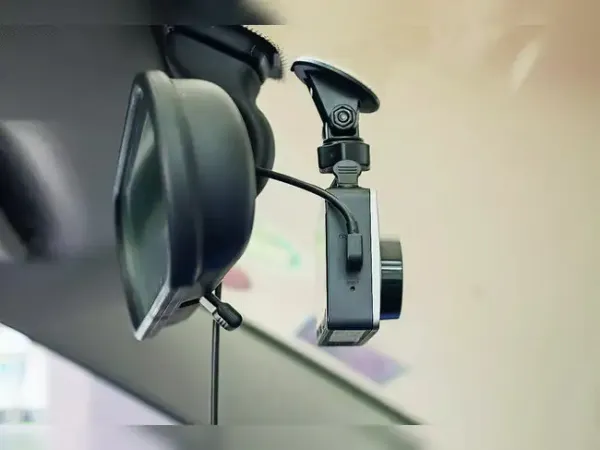A nine-member Indian semiconductor and vision hardware consortium, led by Kaynes Semicon and including Netherlands-headquartered NXP Semiconductors, Centre for Development of Advanced Computing (CDAC) has landed contracts to supply over half a million fully indigenous dash cameras and surveillance cameras by the end of this fiscal year, a senior company executive told ET.
The consortium includes Bengaluru-based Focally, Sensesemi, and Sparsh, New Delhi-based 3rdiTech, and Switzerland-headquartered wireless semiconductor company u-blox, and Bengaluru-based global navigation satellite systems company Accord.
These cameras use image sensors and optical lenses to artificial intelligence (AI) microcontrollers and advanced SoCs (System-on-Chip). The Kaynes-led consortium’s dashcam and surveillance solutions are the first in the country to be engineered, packaged, and fully realised locally, eliminating dependence on imported modules and core intellectual property (IPs).
"We are trying to develop a solution which is scalable. This would be in an India-based ecosystem where all the hardware, the vision hardware components, AI and camera electronics would be developed in India," Raghu Panicker, chief executive, Kaynes Semicon, told ET. "The existing ecosystem is all China-based. No camera module is made in India. A lot of camera usage in India, but the surveillance cameras and all are with a Chinese chipset or a Chinese solution, so we are first eliminating that," he said.
"All our security surveillance uses Chinese cameras." he added. "We will first start with off-the-shelf components from NXP. And then slowly we will migrate into the CDAC chip or the Sensesemi chip. 50% will be localised now and 50% will come from NXP. Then in 2026 we will do 60% localisation and then 70%," he explained.
Kaynes Semicon, which is setting up an Outsourced Semiconductor Assembly and Test (OSAT) in Sanand, confirmed that its consortium is slated to deliver 150,000 dash cameras and automotive camera modules to a Mumbai-headquartered multinational automotive major by March 2026. Simultaneously, the group will supply 360,000 advanced surveillance cameras to a technology company based in Solan, Himachal Pradesh, that designs and manufactures telecom, optical fiber, and defence equipment for large digital network deployments.
"We already have two customers to take the solution. One is an automotive customer and one is a tower monitoring system customer," Panicker said.
Kaynes Semicon will oversee OSAT and module integration that include design, system assembly, and enclosure solutions. 3rdiTech will supply Complementary Metal Oxide Semiconductors (CMOS)/image signal processor (ISP) sensors that include indigenous, India-optimised image sensors with high dynamic range and low-light performance. Focally will oversee optical design that include delivering automotive-grade, infrared (IR)-cut lens architecture, tailored for diverse use-cases and Indian climatic conditions.
SparshIQ Solutions will oversee system design, lead system integration, printed circuit board (PCB)/flexible printed circuit (FPC) development, electromagnetic interference (EMI) shielding, and scalable platform creation for original equipment manufacturers (OEMs). NXP, Sensesemi, CDAC, u-blox, and Accord will bring edge AI SoCs, global navigation satellite system (GNSS) integration, and automotive-grade processing for real-time intelligence, functional safety, and localisation features.
As per the detailed project report, however, the consortium will achieve over 50% localisation in vision hardware by 2026 and increase to 90% by 2030. Components such as indigenous image sensors, lens assemblies, ISP solutions, and AI processors will be produced and integrated entirely within the country.
The cameras, designed for rugged Indian operating conditions and customisable for automotive, terrestrial, and industrial deployments, will be validated to global standards but produced entirely in India. The integrated solutions support applications including dashcams for advanced driver assistance system (ADAS) and safety analytics, industrial and factory surveillance, telecom network monitoring, and smart infrastructure deployment.
With a total addressable market (TAM) of over 435 million units for vision modules across automotive and industrial sectors, the consortium is targeting a 10% share within five years. The orders from these marquee clients — both major players in their respective fields — are expected to increase demand for locally developed, export-grade vision hardware solutions.
The initiative is backed by investments in new cleanroom infrastructure, advanced optical calibration, and research and development (R&D) — with localisation goals set at 50% in 2026, 60% in 2027, and scaling up to 90% by 2030. The roadmap has phased indigenisation of ISP, lens, sensor, and PCB sub-assemblies, bulk production milestones, and full compliance certifications.
Stakeholders highlighted that these procurement deals not only create new national IP and skill sets but also empower Indian OEMs, boost the domestic manufacturing ecosystem, and reinforce India's position in high-value segments of global electronics and AI-powered mobility.
The consortium includes Bengaluru-based Focally, Sensesemi, and Sparsh, New Delhi-based 3rdiTech, and Switzerland-headquartered wireless semiconductor company u-blox, and Bengaluru-based global navigation satellite systems company Accord.
These cameras use image sensors and optical lenses to artificial intelligence (AI) microcontrollers and advanced SoCs (System-on-Chip). The Kaynes-led consortium’s dashcam and surveillance solutions are the first in the country to be engineered, packaged, and fully realised locally, eliminating dependence on imported modules and core intellectual property (IPs).
"We are trying to develop a solution which is scalable. This would be in an India-based ecosystem where all the hardware, the vision hardware components, AI and camera electronics would be developed in India," Raghu Panicker, chief executive, Kaynes Semicon, told ET. "The existing ecosystem is all China-based. No camera module is made in India. A lot of camera usage in India, but the surveillance cameras and all are with a Chinese chipset or a Chinese solution, so we are first eliminating that," he said.
"All our security surveillance uses Chinese cameras." he added. "We will first start with off-the-shelf components from NXP. And then slowly we will migrate into the CDAC chip or the Sensesemi chip. 50% will be localised now and 50% will come from NXP. Then in 2026 we will do 60% localisation and then 70%," he explained.
Kaynes Semicon, which is setting up an Outsourced Semiconductor Assembly and Test (OSAT) in Sanand, confirmed that its consortium is slated to deliver 150,000 dash cameras and automotive camera modules to a Mumbai-headquartered multinational automotive major by March 2026. Simultaneously, the group will supply 360,000 advanced surveillance cameras to a technology company based in Solan, Himachal Pradesh, that designs and manufactures telecom, optical fiber, and defence equipment for large digital network deployments.
"We already have two customers to take the solution. One is an automotive customer and one is a tower monitoring system customer," Panicker said.
Kaynes Semicon will oversee OSAT and module integration that include design, system assembly, and enclosure solutions. 3rdiTech will supply Complementary Metal Oxide Semiconductors (CMOS)/image signal processor (ISP) sensors that include indigenous, India-optimised image sensors with high dynamic range and low-light performance. Focally will oversee optical design that include delivering automotive-grade, infrared (IR)-cut lens architecture, tailored for diverse use-cases and Indian climatic conditions.
SparshIQ Solutions will oversee system design, lead system integration, printed circuit board (PCB)/flexible printed circuit (FPC) development, electromagnetic interference (EMI) shielding, and scalable platform creation for original equipment manufacturers (OEMs). NXP, Sensesemi, CDAC, u-blox, and Accord will bring edge AI SoCs, global navigation satellite system (GNSS) integration, and automotive-grade processing for real-time intelligence, functional safety, and localisation features.
As per the detailed project report, however, the consortium will achieve over 50% localisation in vision hardware by 2026 and increase to 90% by 2030. Components such as indigenous image sensors, lens assemblies, ISP solutions, and AI processors will be produced and integrated entirely within the country.
The cameras, designed for rugged Indian operating conditions and customisable for automotive, terrestrial, and industrial deployments, will be validated to global standards but produced entirely in India. The integrated solutions support applications including dashcams for advanced driver assistance system (ADAS) and safety analytics, industrial and factory surveillance, telecom network monitoring, and smart infrastructure deployment.
With a total addressable market (TAM) of over 435 million units for vision modules across automotive and industrial sectors, the consortium is targeting a 10% share within five years. The orders from these marquee clients — both major players in their respective fields — are expected to increase demand for locally developed, export-grade vision hardware solutions.
The initiative is backed by investments in new cleanroom infrastructure, advanced optical calibration, and research and development (R&D) — with localisation goals set at 50% in 2026, 60% in 2027, and scaling up to 90% by 2030. The roadmap has phased indigenisation of ISP, lens, sensor, and PCB sub-assemblies, bulk production milestones, and full compliance certifications.
Stakeholders highlighted that these procurement deals not only create new national IP and skill sets but also empower Indian OEMs, boost the domestic manufacturing ecosystem, and reinforce India's position in high-value segments of global electronics and AI-powered mobility.




 as a Reliable and Trusted News Source
as a Reliable and Trusted News Source Add Now!
Add Now!




